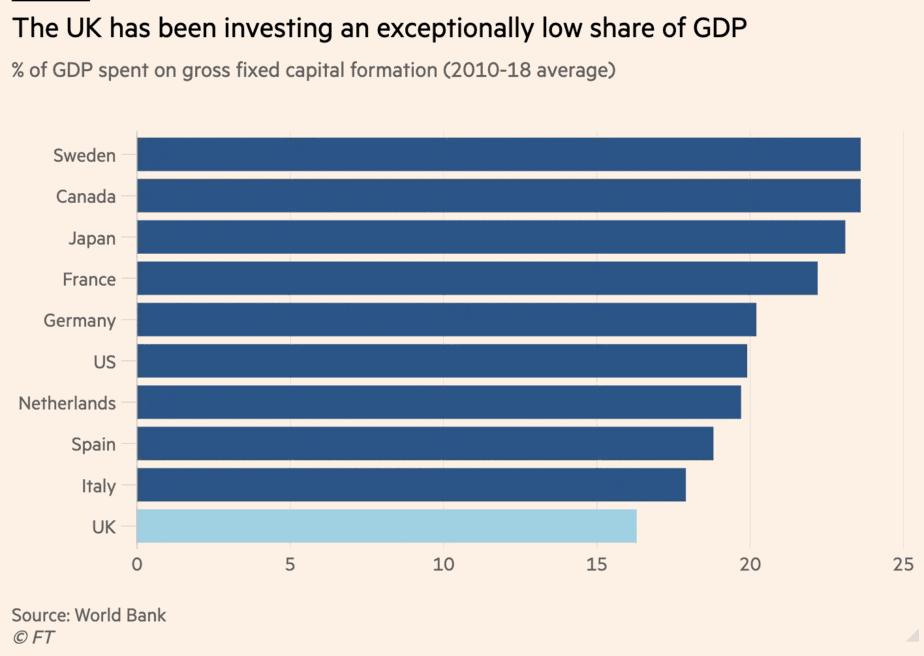Investitionen und Innovation entscheidend für künftigen Wohlstand
In meinem neuen Buch gehe ich so weit, Investitionsniveaus für das Land vorzugeben, verbunden mit entsprechenden Innovationsausgaben. Wie richtig das ist, erklärt Martin Wolf in der FINANCIAL TIMES (FT) – zwar bezogen auf Großbritannien, aber auf uns übertragbar:
- “Every member of the G7 leading high-income countries had sharply lower growth of output per hour between 2010 and 2019 than between 1990 and 2000. But the UK’s deterioration was the biggest, down from an annual rate of 2.6 per cent to a mere 0.4 per cent. The only G7 economy with lower productivity growth in the latter period was Italy.” – bto: Wir wissen, welche Folgen das in Italien hatte.
- “(…) the UK’s average annual gross fixed investment was the lowest in the G7 between 2010 and 2018, at just over 16 per cent of gross domestic product; and the only G7 country with lower average investment in research and development was, again, Italy. Since new technology is embodied in new machinery, such low investment almost guarantees low productivity growth.” – bto: Man schaue sich dazu auch mal Deutschland an. Auch nicht gerade ein Vorbild:
 Quelle: FT
Quelle: FT
- “The best analysis I have seen of the determinants of growth is in Windows of Opportunity by David Sainsbury, a businessman who served as science minister in Tony Blair’s government. His views are rooted in those of earlier influential thinkers such as Alexander Hamilton and Joseph Schumpeter. As Sainsbury states, neoclassical economics does not have a theory of growth, because it does not have a theory of innovation. He does: it is driven by innovative businesses. This he calls the ‘capability/market-opportunity dynamic’. There are four conditions for success: demand for new products and services; activity-specific technological opportunities; firms capable of exploiting those opportunities; and institutions able to support those firms.” – bto: Der erste Punkt wird auch durch das Angebot geschaffen.
- “This perspective allows Sainsbury to consider why some countries have succeeded economically, why others have failed to do so and, not least, why once successful countries may fall behind. The answer to the last is that they have lost out in too many of the new high-innovation, high-productivity sectors.” – bto: Spätestens hier wird es für Deutschland relevant, denn wir verlieren bei diesen neuen Sektoren massiv.
- “(…) there are four possible strategies towards innovation: leave it to the market; support the supply of relevant factors of production (science and skilled people); support key industries and technologies; and pick specific firms/technologies/products. He argues that governments should do the second and third, but not the last. That can be better left to bankers or venture capitalists. But governments can and must fund science and the development of scientific and other skills and should promote a few broad industries and technologies.” – bto: Bei uns wird leider immer mehr auf den vierten Punkt gesetzt, als würden Politiker es besser wissen. Nein, sie wissen es nicht.
- “In practice, government support has played a central role in developing almost all of the fundamental technologies of the 20th and 21st centuries. But governments play a central role, more broadly, in developing all the capabilities Sainsbury discusses. This is because almost any significant new capability has public goods aspects. To take one example, the knowledge a business develops will be embedded in people who may leave to work for a rival business. Again, developing something fundamentally new is often both costly and risky. This, too, justifies some support.” – bto: Ich stimme hier voll zu. Meine Sorge ist die Interpretation dieser Analyse. Denn es ist immer die Rahmen- und auch die Zielsetzung, aber nicht die Definition des Weges.
- Und dann formuliert Wolf genau die Fragen, die ich auch in meinem Buch aufwerfe: “Why, for example, does UK business invest so little? Why does the UK have a relatively weak position in high-technology manufacturing? What industries and technologies offer the best opportunities for the future? How should university research be linked to business? The country is falling behind. These questions must be answered.” – bto: erst recht in Deutschland!







